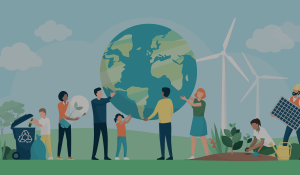
We’re all yearning to get outside. After a year indoors, the sun coming out as hundreds of millions American receive covid-19 vaccines holds promise of reuniting with loved ones and feels unbelievably hopeful. We are getting outside, too.
In the past year, gardening became a national pastime. Green America saw Climate Victory Gardens swell to 9,170 across the country—which is no wonder, since gardeners spent 42 percent more time in the dirt last year, according to a November survey from Axios. National Parks Service reported that 15 parks set visitation records in 2020 and hiking and nature walking soothed our souls in state and local parks too.
Being outside, whether that’s sitting on a bench in a public park or foraging for wild edibles in the forest, has healing power. Year after year, studies show that being around nature in any form can improve mental health and even physical health by lowering blood pressure and stress hormones. This summer, we want to celebrate everyone embracing that healing for themselves and for the Earth.
We can start by getting personal—there are so many ways we can learn more about the Earth and take care of it better, without going very far past our front doors. If you have a yard, start by checking if there’s anything you can do to make it work better for the earth—swap out elements that might be climate hazards in 5 Steps to a More Sustainable Backyard.
Order Your Copy of Green American Magazine
If you’ve started to think about starting or expanding gardening but have felt overwhelmed. Every journey begins with one step—you can get inspired by reading what gardeners, farmers, and foragers wish they knew when they started. Maybe you’ve tried gardening, or even just letting your lawn get wild, and gotten pushback from a homeowners’ association or your neighbors. Readers ask us about this from time to time so we got answers from two seriously impressive Climate Victory Gardeners who fought for their gardens, in Lawn vs. Garden: Stand Up to Your HOA for a Healthier Yard.
Not all of us can afford or want our own green space to care for, but we can all appreciate a park picnic or stroll in the shade. For urban populations, a necessary escape to a park may not be right down the street, especially in Black and Brown communities. Environmental justice advocates are working to bring parks to parts of cities that need them most in Access to Green Space is an Environmental Justice Issue.
People in urban areas and rural ones have both turned to foraging edibles in nature. The practice has a foundation that goes deep in human history to the first gatherers, all the way to today. Modern foragers are picking up the practice thanks to experts like the ones in Forage to Fork: Eat Local with Wild Foods.
Growing food can be the most gratifying connection with the Earth, when something starts from seed, grows out of the dirt, and ends up nourishing ourselves and our families. Toxic, synthetic pesticides and fertilizers became popular for their ability to increase yields and shrink losses, but at a cost to the health of the soil and the organisms who come in contact with the chemicals. Farmers in The Toxic Problem with Pesticides and Fertilizers turned to regenerative practices and found their soil, crops, animals, and selves were happier because of it.
Regenerative agriculture has gained popularity in recent years, but its roots are very old. The practices farmers are taking on to mitigate the climate crisis are the same that Indigenous growers have been using for millennia to steward the Earth. In Native Growers Decolonize Regenerative Agriculture, Native American growers from across Turtle Island (North America) share their perspectives on what regenerative means to them and where they hope the movement will go, and how they are working towards food sovereignty for Native peoples in their own communities.
What ties these stories together is that what’s natural is healing—as people move closer to respecting and restoring natural ecosystems, the health of the people, plants, and planet improves. What’s healthy isn’t always what’s easy, but Climate Victory Gardener Aja Yasir has had her share of fighting for what’s green and the fight was worth it. When she goes to her garden, she feels empowered and works toward healing.
“I [can] go into my garden. I could look at all these flowers. I can be amongst all this fruit, all these vegetables. I can just touch the soil, I can gather rainwater, and I just felt so at peace.”
Let’s join Aja in creating that healing and finding that peace for ourselves and for the Earth.







